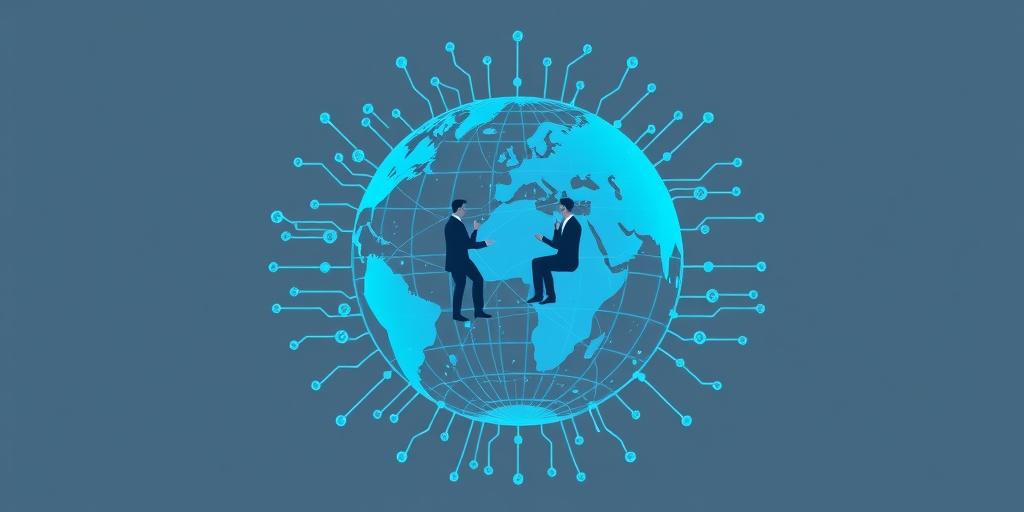The Digital Handshake: How Tech is Rewriting International Diplomacy
In an era defined by rapid technological advancements, the staid world of international diplomacy is undergoing a seismic shift. Forget backroom deals and hushed whispers – the future of global relations is increasingly being shaped by algorithms, AI, and the boundless possibilities of the digital realm. Let's dive into how tech is revolutionizing diplomacy, creating new pathways for communication, negotiation, and collaboration.
From Embassies to Encryption: The Evolving Landscape
Traditionally, diplomacy has relied on face-to-face interactions, formal protocols, and carefully crafted communiqués. While these elements remain important, technology is adding new layers of complexity and opportunity. Here’s how:
- Digital Diplomacy: Embassies and foreign ministries are leveraging social media, websites, and online platforms to engage with foreign publics, disseminate information, and counter disinformation. Think of it as public diplomacy 2.0.
- Secure Communication: Encrypted communication channels are essential for secure dialogue between diplomats and government officials. This ensures sensitive information remains protected from espionage and cyber threats.
- Data Analytics: Analyzing vast datasets can provide valuable insights into global trends, political sentiment, and potential conflict zones. This data-driven approach enables diplomats to make more informed decisions and anticipate emerging challenges.
- AI in Diplomacy: Artificial intelligence is being used to automate tasks, translate languages in real-time, and even predict potential diplomatic outcomes. While AI won’t replace human interaction, it can augment diplomatic capabilities and enhance efficiency.
The Rise of Virtual Summits and Digital Negotiations
The COVID-19 pandemic accelerated the adoption of virtual summits and digital negotiations. While initially a necessity, these virtual platforms have proven to be surprisingly effective in facilitating international dialogue. Benefits include:
- Increased Accessibility: Virtual platforms enable participation from a wider range of stakeholders, including those who may not have the resources to travel to in-person events.
- Reduced Costs: Virtual diplomacy significantly reduces travel, accommodation, and logistical expenses, making it a more cost-effective option for cash-strapped nations.
- Enhanced Efficiency: Digital tools can streamline negotiations, facilitate real-time information sharing, and accelerate decision-making processes.
Navigating the Challenges: Cybersecurity and Digital Divides
While technology offers immense potential for international diplomacy, it also presents significant challenges. Two key concerns are:
- Cybersecurity: Diplomatic networks are vulnerable to cyberattacks, espionage, and data breaches. Protecting sensitive information and critical infrastructure is paramount.
- Digital Divides: Unequal access to technology and digital literacy can exacerbate existing inequalities between nations. Bridging the digital divide is essential to ensure that all countries can participate fully in the future of diplomacy.
The Human Element: Diplomacy in the Digital Age
Despite the growing influence of technology, the human element remains crucial in international diplomacy. Building trust, fostering relationships, and understanding cultural nuances are essential skills that cannot be replicated by algorithms. The future of diplomacy will require a hybrid approach, combining the power of technology with the art of human interaction.
Long-Tail Keywords:
- "tech-driven international relations"
- "digital transformation of diplomacy"
- "cybersecurity challenges in diplomacy"
- "AI applications in foreign policy"
- "virtual summits and global negotiations"
Conclusion: Embracing the Future of Diplomacy
The integration of technology into international diplomacy is not merely a trend; it is a fundamental shift that will reshape the landscape of global relations. By embracing innovation, addressing the challenges, and prioritizing the human element, we can harness the power of technology to build a more connected, collaborative, and peaceful world.









